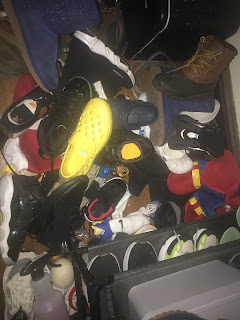Bad Spending Habits All Around Me...
The house had been empty for years...Not because it's in a bad neighborhood.
Empty because the cost of maintaining this house is too high.
Old-world construction is very strong and sturdy, but the cost of heating + cooling this place is extreme. It's the kind of house that OK during the cool months, but feels hotter than the outdoors during the summer, and colder than outside when the weather gets frosty.
And then there is the property tax. Extremely onerous, and it never goes away. And if the bill goes unpaid for a long time, as it has here, a lien can happen, then a tax sale...💰😭💸😭💸
Student-loan debt is pure evil. Many years ago, when I was really struggling, I defaulted, and "they" were able to access my bank account and take every penny I had. It was less than $1,000, and they just took it without warning. I wasn't able to pay my rent. It was hell.
Losing control with credit-card debt? MUCH worse. Did that when I was young and stupid, but eventually get my act together and paid it all down to $0.
But credit-card debt is unsecured. A bank can't take your home away from you, no matter how much credit-card debt you have. BIG difference.
So my cousin decided to move into this house and give living here a shot. Made sense to her, because she landed a great nursing job in NYC. Great pay, A+ benefits and all the overtime she wants. Only problem was that she lived in Massachusetts. This house solved that.
So now my cousin has two places that she calls home, in two different states. She commutes back and forth a lot, but the 3-hour drive goes by fast, especially on weekends.
My mother (RIP) spent lots of money on repairs and renovation. Other members of my extended family pitched-in too. While empty, thieves and/or squatters did bad things.
There are young children here, but the house is big, and the walls are thick. Noise is contained, and the kids have plenty of room play, without disturbing anyone. The situation here is cool and calm and drama-free, which is very, VERY important to me. After all I've been through over the past 22 years, I have no tolerance for ugly behavior of any kind. ZERO TOLERANCE!
There is, however, a nagging concern here: my cousin and her husband are both shopaholic-spendaholics. There is more footwear dumped all around this house than I have EVER seen in any home. There must be at least 300 pairs of shoes...In every corner, and every room. Moreover, there are more daily deliveries from Amazon than I used to see in the retail outlet I managed years ago. Stacks of boxes, all shapes and sizes, and from all over the world, waiting outside, every day. Crazy....😱📦🥴📦😱📦😵💫📦😱
The mother of my child was REALLY GOOD at wasting money, and doing so in the most despicable way. Tantamount to just flushing it down the toilet. So yeah: these things bother me...😑😒😐🫤
Labels: Amazon, Amazon.com, home, homes, households, housing, money, Money_Habits, overspending, saving money, saving_money, Shoes, Sneakers, spending, Spending_Habits, student_loan_debt, student_loans, Throwing_Money_Away
|
--> www.FedPrimeRate.com Privacy Policy <--
CLICK HERE to JUMP to the TOP of THIS PAGE --> SITEMAP <-- |







